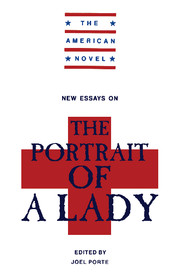Book contents
- Frontmatter
- Contents
- Series Editor's Preface
- A Note on the Text
- 1 Introduction: The Portrait of a Lady and “Felt Life”
- 2 The Portrait of a Lady and Modern Narrative
- 3 The Fatherless Heroine and the Filial Son: Deep Background for The Portrait of a Lady
- 4 The Portrait of a Lack
- 5 Frail Vessels and Vast Designs: A Psychoanalytic Portrait of Isabel Archer
- Notes on Contributors
- Selected Bibliography
5 - Frail Vessels and Vast Designs: A Psychoanalytic Portrait of Isabel Archer
Published online by Cambridge University Press: 04 August 2010
- Frontmatter
- Contents
- Series Editor's Preface
- A Note on the Text
- 1 Introduction: The Portrait of a Lady and “Felt Life”
- 2 The Portrait of a Lady and Modern Narrative
- 3 The Fatherless Heroine and the Filial Son: Deep Background for The Portrait of a Lady
- 4 The Portrait of a Lack
- 5 Frail Vessels and Vast Designs: A Psychoanalytic Portrait of Isabel Archer
- Notes on Contributors
- Selected Bibliography
Summary
ONE psychological characteristic of nineteenth-century literature is the occultation of the mother. James's The Portrait of a Lady displays its family resemblance to other novels and autobiographies of the period by assuming that the relation between father and child (son) is at the center of the universe of human development, love, and autonomy, and by obscuring the relation between mother and child. That James observes this convention, and at the same time writes a mimetic text about a woman, is a curious situation. Isabel proudly proclaims that she has neither father nor mother, that she makes herself; but it is Isabel's mother (not her father) who is scarcely mentioned and who seems to have been excised from the novel. Since the development of female subjectivity depends, first of all, on a maternal identification, the feminist reader is compelled to ask what James has done with Isabel's mother and how this maternal absence shapes Isabel's dream of self-fashioning. Since the mother cannot be effaced unproblematically, and since erasure in this case is a strategy of closure at both the level of character and the level of narrative performance, an intriguing possibility arises: perhaps the mother's absence serves as the submerged organizing principle of the text.
For Isabel, the desire to establish a potentially autonomous ego becomes an urgent, though unknowing, response to the absent mother. This is a provocative claim. James's portrait of Isabel has been widely understood as a creative response to his own literary fathers, primarily Emerson and Hawthorne.
- Type
- Chapter
- Information
- New Essays on 'The Portrait of a Lady' , pp. 123 - 162Publisher: Cambridge University PressPrint publication year: 1990
- 1
- Cited by

